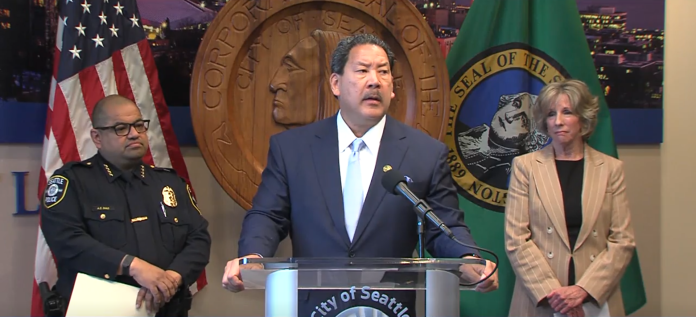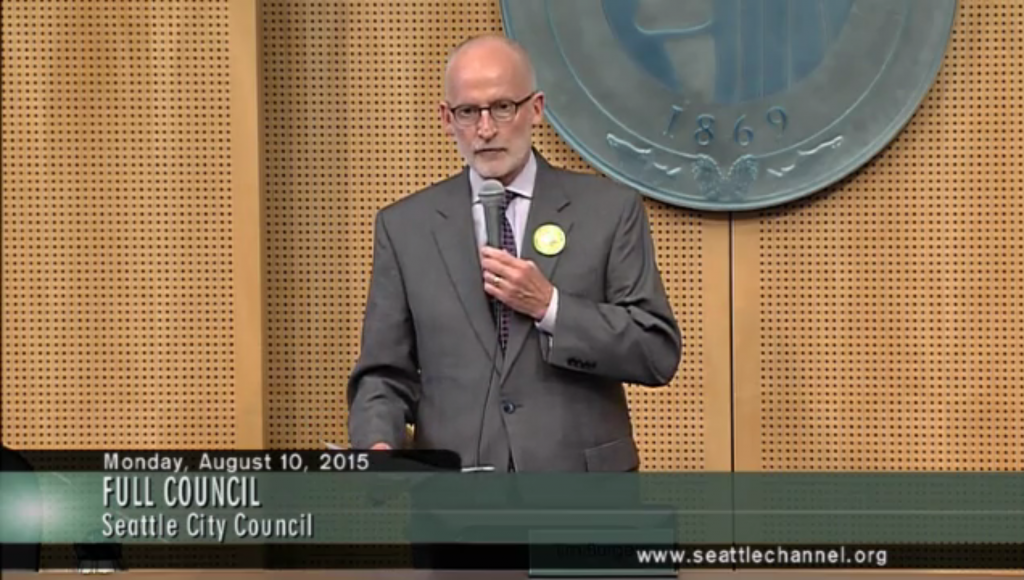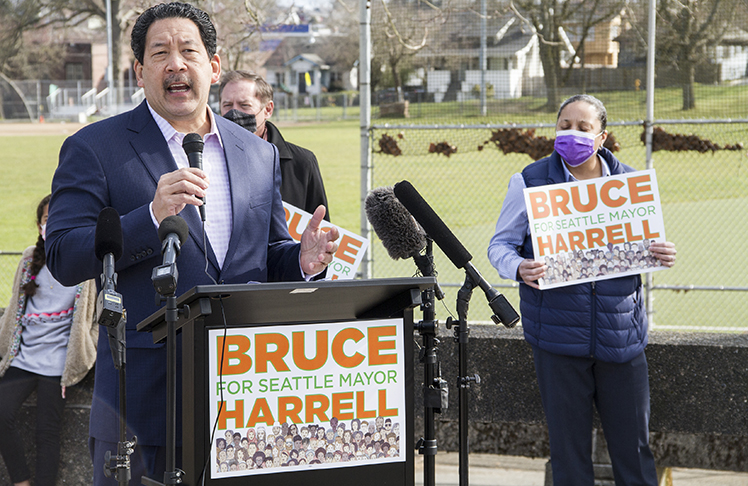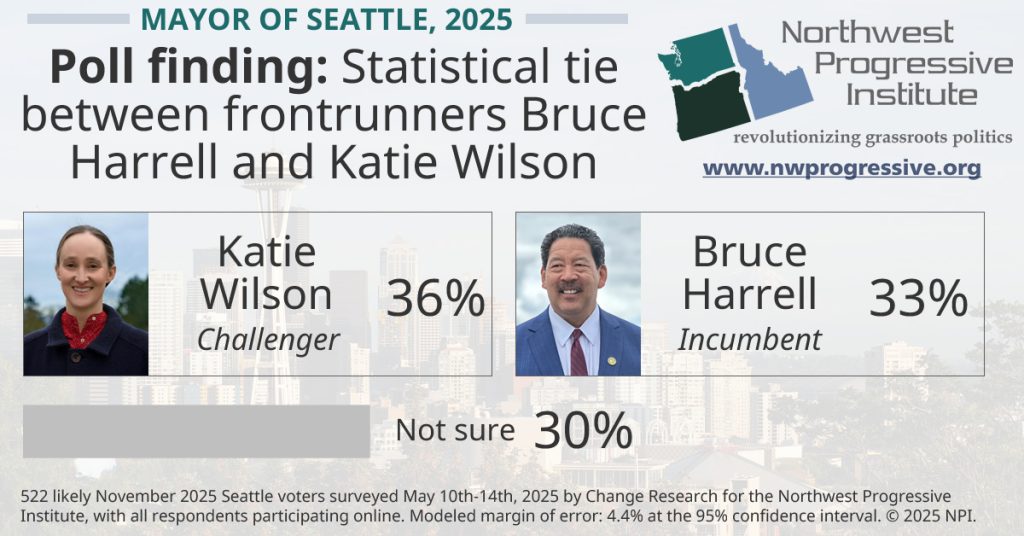
Last week, former Seattle Police Department (SPD) Chief Adrian Diaz filed a lawsuit against the City and Mayor Bruce Harrell, alleging wrongful termination, retaliation, and wage theft, among other issues.
Last May, Harrell announced that he was replacing Diaz with Chief Sue Rahr. At the time, Diaz was mired in an array of harassment and discrimination lawsuits, and Harrell said he was concerned about leaving Diaz in a place where he’d be able to retaliate against those bringing allegations against him. Diaz was instead given the vaguely defined role of head of “special projects.”
Then in December, Harrell announced that he was firing Diaz due to Diaz’s failure to follow policies around dishonesty, professionalism, avoiding and disclosing conflicts of interests, and improper personal relationships. Primary among Harrell’s reasons were that Diaz had conducted an intimate relationship with Chief of Staff Jamie Tompkins and later lied about it to an investigator.
Diaz also filed a $10 million tort claim against the City in October, which in addition to wrongful termination alleged discrimination, harassment, and retaliation related to Diaz coming out as gay to Harrell and Senior Deputy Mayor Tim Burgess. At that time, Diaz’s attorney, Jacob Downs, told KOMO News that the mayor’s office “demanded Diaz take unlawful disciplinary action against an officer,” a claim that is explained in detail in the new lawsuit.
“While City leaders unfairly accused me of dishonesty and unprofessional conduct, there is critical evidence disproving those allegations that the City intentionally overlooked, minimized, and ignored,” Diaz said In a statement released on Wednesday. “Additionally, I voluntarily took a polygraph test that confirmed the truthfulness of my statements during the investigation, and a handwriting expert has discredited the so-called key evidence the City purportedly relied upon in terminating my employment. The Mayor and City leaders have unfortunately left me with no other choice than to seek justice through legal action.”
The Mayor’s Office shot back, via spokesperson Jamie Housen.
“We don’t typically comment on active litigation; however, in this case we will say: When all we had was rumor and innuendo regarding Adrian Diaz, we took him at his word,” Housen told The Urbanist. “After we received the facts from an independent investigation, he was terminated for dishonesty. We are confident that the fact finding allowed by the litigation process will demonstrate the truth.”
The lawsuit’s claims of retaliation
The lawsuit alleges that Diaz was fired in retaliation for his disciplinary decision regarding SPD officer Dan Auderer, who sparked an international incident when audio from his body-worn camera was released that appeared to mock the death of Jaahnavi Kandula, who was killed in January of 2023 when SPD officer Kevin Dave hit her in a crosswalk with his patrol car while traveling 74 miles per hour.
“Yeah, just write a check,” Auderer said. “Eleven thousand dollars. She was 26, anyway. She had limited value.”
Auderer also served as vice president of the Seattle Police Officers Guild (SPOG) at that time.

According to the lawsuit, Diaz planned to put Auderer on administrative leave while potential disciplinary action was explored, but Burgess told him he couldn’t do so because Auderer was one of the key people negotiating the SPOG contract. Diaz allegedly protested this order, but Auderer wasn’t put on leave at that time.
The lawsuit states that Harrell pulled Diaz aside and told him to fire Auderer more than once, which Diaz said would be a violation of due process and the city’s accountability ordinance.
Diaz’s lawsuit latches on to this apparent infighting in the Harrell camp: “Chief Diaz was essentially stuck in the middle of Deputy Mayor Burgess’s administrative goals of successfully negotiating the SPOG contract and Mayor Harrell’s political goals of responding to community outcry for swift and firm justice.”
Burgess told Diaz he could do as he wished with Auderer once the SPOG contract negotiations had been completed, the lawsuit claims. On May 6, 2024, Diaz alleges he informed Burgess he had decided to issue the second highest level of discipline on Auderer, which was a 30-day suspension with a last-chance agreement. The highest level of possible discipline would have been termination.

A last-chance agreement, which must be approved by SPOG, involves an agreement that the officer being disciplined isn’t contesting said discipline. The officer enters a trial period, which is often a couple of years, where if they have any sustained misconduct, they are then terminated and cannot fight that determination.
Outright termination, on the other hand, can be appealed in arbitration. A study conducted in 2020 found that termination cases are overturned by arbitrators 46% of the time, with the agency in question often being required to rehire the officer.
Within a few weeks of Diaz sharing his decision regarding Auderer’s discipline, the lawsuit states that Burgess had spoken to Rahr, offered her the position of Chief of Police, and launched the investigation into the rumors of Diaz’s affair with Tompkins. The anonymous complaint about the rumor of the Diaz-Tompkins relationship had been filed ten months earlier.
This investigation, overseen by the Office of the Inspector General (OIG), eventually led to Harrell’s decision to fire Diaz at the end of the year. Meanwhile, Rahr made the decision to fire Auderer in July 2024.
Auderer filed a $20 million tort claim against the City in August, claiming he had been wrongfully terminated and had been retaliated against due to his SPOG leadership position.
New information about the investigation
The Urbanist previously reported that Monisha Harrell, who was Senior Deputy Mayor and direct supervisor to Diaz until her departure in June of 2023, hadn’t been questioned as part of the independent investigation of Diaz, in spite of Tompkins requesting the interview take place. Monisha is Mayor Bruce Harrell’s niece.

The investigation said that many people who investigator Shayda Le interviewed believed Diaz had created the Chief of Staff position, which had not previously existed, for Tompkins, and that he did so because of his romantic relationship with Tompkins. It pointed to the lack of formal job description for the role.
However, Monisha Harrell recently told Fox 13 that when she was supervising Diaz, they were having discussions about the creation of a Chief of Staff position as part of an organizational restructuring of SPD, which included exploration of which roles would require sworn staff versus which could be civilianized.
“Given the focus on future recruitment, we prioritized trying to find someone for the Chief of Staff role that could help tell the story of SPD to open the pipeline for new recruits,” Monisha Harrell told Fox 13.
Furthermore, Harrell said that Tompkins was not the first choice for the job, confirming Diaz’s statements in his interview with Le.
It is unclear why Le wouldn’t have been interested in conducting an interview with Harrell given her direct knowledge of matters relevant to the case.
Diaz also says he passed a polygraph test that confirmed he was being truthful during the investigation. However, the accuracy of polygraph tests is contested and their use as primary evidence is controversial.
The lawsuit states that the City told the Washington State Employment Security Department that Diaz had engaged in misconduct, leading the department to deny Diaz’s claim for unemployment benefits. However, at a hearing before the Washington State Office of Administrative Hearings at which Diaz presented evidence, an administrative law judge reversed this decision, giving Diaz unemployment benefits.
The lawsuit states, “In his detailed findings of fact, the administrative law judge specifically found that: The investigation undertaken by the City, and used as their reason for termination, was characterized by the City as thorough and complete, yet relied on one documentary piece of evidence (card) which was contested by Chief Diaz and experts, relied on no known witnesses to any alleged relationship, and refused to hear potentially exculpatory evidence.”
Other claims in the lawsuit
The lawsuit states that the “special projects” position Diaz was placed into following his demotion from Chief was “fabricated,” reported directly to the Mayor’s Office, and consisted of no duties aside from appearing as a witness in lawsuits on behalf of the City. The lawsuit says this assignment was a “blatant act of retaliation.”
However, even though Diaz wasn’t assigned any duties, PubliCola reported that as of September 2024, he was still listed in the city’s salary database as making $338,560 a year.
The lawsuit claims the City engaged in wage theft against Diaz by misclassifying his “executive leave” as “sick leave,” a mistake that accounted for “tens of thousands of dollars.” It is unclear whether this mistake might be the result of widespread errors city workers say have been made as a result of the City’s new Workday payroll system, which is the subject of a class action lawsuit filed this February.
The Urbanist reported that Diaz’s legal team had been requesting a criminal investigation of events surrounding his termination, which could include SPD officers engaging in unlawful surveillance, stalking, and forging evidence. The lawsuit claims the City said it could not proceed with such an investigation without a written complaint from Diaz, but when Diaz submitted a report requesting an investigation, the City changed its mind about initiating an investigation.
The lawsuit also claims that the OIG “repeatedly violated Washington’s Public Records Disclosure Act by unlawfully leaking certain records and information related to the ongoing investigation to select media members without notice to Chief Diaz.”
Real Change reported on a $10 million tort claim filed in January by Lacey Gray, the former records manager at the OIG, who alleges she was fired in retaliation for raising concerns about the OIG mishandled records pertaining to the office’s investigation into Diaz.
A letter from Gray’s legal counsel notes that in October of 2024, Gray became aware that the Deputy Inspector General, Alyssa Morris, had “released certain investigation records to multiple media members without going through the proper public disclosure process.” The letter alleges that the records were released without giving notice to the City employees who were mentioned in the records.
Diaz’s lawsuit alleges something similar, saying Inspector General Lisa Judge released records without giving notice to Diaz, and only doing so for “certain hand-picked members of the media, as opposed to all interested individuals who had submitted a request for the records.”
The OIG appears to be embroiled in more than one controversy. In addition to questions as to how the office handles public records requests, The Urbanist recently reported on Judge using public funds illegally to pay for a private parking spot. Judge also recused herself in an investigation into the Seattle Office of Police Accountability illegally disclosing medical records of a protester nearly killed by a blast ball in 2020 — only to continue to be heavily involved in the case behind the scenes, apparently.
A problem for Bruce Harrell?
Diaz’s lawsuit is inconvenient for Mayor Harrell, who is currently running for reelection. In recent polling from the Northwest Progressive Institute, challenger Katie Wilson was shown to have a slight lead over Harrell in a head-to-head race.

From accusations that Harrell pulled a gun on a pregnant lady over a parking spot to a gaffe joking about the return of the Sonics basketball team to a comment praising President Donald Trump for surrounding himself with “smart innovators” like Peter Thiel and Elon Musk, Harrell has had a rough 2025 thus far. Further scandal could make the mayoral race that much tighter.
Meanwhile, Harrell’s choice for Diaz’s replacement as Chief of Police, Shon Barnes, will be moving through the city council confirmation process this June. It remains to be seen how Barnes will fare in the political minefield that exists for Seattle’s top cop.
Amy Sundberg is the publisher of Notes from the Emerald City, a weekly newsletter on Seattle politics and policy with a particular focus on public safety, police accountability, and the criminal legal system. She also writes science fiction, fantasy, and horror novels. She is particularly fond of Seattle’s parks, where she can often be found walking her little dog.

